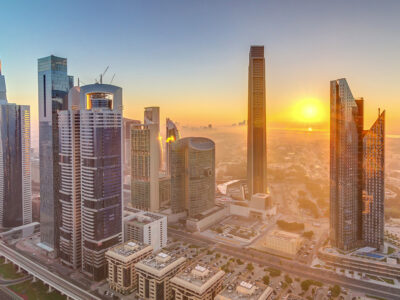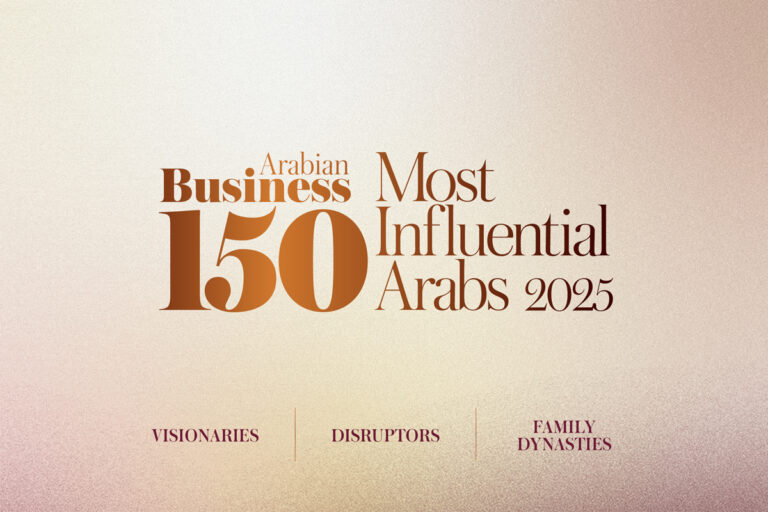This list of 150 Most Influential Arabs 2025 marks an evolution in how we recognise and understand regional leadership. This year’s expanded list – which has grown from 100 to 150 – introduces a three-category structure that captures the full spectrum of Arab influence: Family Dynasties, Disruptors, and Visionaries.
Each of these distinct categories have been evaluated using our most sophisticated methodology yet. Nine weighted metrics – from legacy and economic contribution to cultural impact, innovation, and social reach – were applied by our panel. The result is a nuanced portrait of Arab leadership that recognises influence isn’t one-dimensional, but flows through multiple channels of power.
Family Dynasties celebrates the multigenerational empires anchoring regional economies while reinventing tradition for a new era. These are the names most people will recognise. Here you’ll find Khalaf Ahmad Al Habtoor, whose Al Habtoor Group has evolved from a small engineering firm in 1970 into a diversified conglomerate spanning hospitality, real estate, and education across multiple continents. Abdul Aziz Al Ghurair appears prominently, not just for his leadership of Mashreq Bank but for stewarding a foundation that has provided educational opportunities to over 230,000 young Arabs. Then there’s history-making Lubna Olayan, who joined her family’s business in the 1980s and who became the first woman to chair a Saudi bank.
Disruptors spotlights entrepreneurs and trailblazers rewriting industry playbooks. Huda Kattan leads this category, having transformed a $6,500 investment into a beauty empire worth billions, while Khaldoon Al Mubarak guides Mubadala’s $330 billion in assets across 50 countries. Adel Ali, Air Arabia’s Group CEO, is pioneering in the aviation sector, while Ahmed Al Musawa Al Hashemi is shaking up the rail industry. These are leaders who don’t just adapt to change – they create it.
Visionaries, meanwhile, honours the policymakers, cultural pioneers, and long-term thinkers whose ideas define narratives across generations. Yasir Al-Rumayyan tops this category, steering Saudi Arabia’s Public Investment Fund through the kingdom’s economic transformation, while Mohamed Alabbar continues to reshape skylines and digital commerce across the region. Here, we have new entrants like Samia Bouazza, Group CEO of Multiply Group, whose most profound career moment was being the first woman to take a company public on the Abu Dhabi Stock Exchange.
The geography: Beyond traditional borders
While the UAE maintains strong representation with leaders from Dubai and Abu Dhabi, the 2025 list reveals a more distributed map of influence. Saudi Arabia’s presence has notably increased, particularly in the Disruptors category, reflecting Vision 2030’s momentum. Leaders like Sultan Batterjee, whose IHCC ranks among Saudi Arabia’s top five construction companies while pioneering sustainability initiatives, exemplify the Kingdom’s transformation.
The Lebanese diaspora’s influence has evolved from Lebanon-based businesses to regional and global enterprises built from Gulf foundations. Ronaldo Mouchawar, who sold Souq.com to Amazon for $580 million and now leads Amazon’s Middle East operations, represents this shift. Similarly, Fadi Ghandour has transitioned from founding Aramex to becoming the region’s premier startup ecosystem builder through Wamda.
Qatar, Kuwait, Bahrain, and Oman each contribute influential figures who are reshaping their national economies while building cross-border enterprises. Egypt’s representatives increasingly operate at the intersection of regional investment and local development, bridging Arab capital with North African opportunities.
Sector evolution
While traditional industries such as energy, real estate, and finance remain well-represented, they no longer dominate exclusively – and the 2025 list reveals several sectoral shifts.
Technology and digital platforms have firmly established their place, with leaders like Abdallah Abu-Sheikh, whose Botim app serves 150 million users globally, and Noor Sweid of Global Ventures, which represents a generation building digital infrastructure that’s as fundamental as roads or railways.
Healthcare and life sciences have surged in influence. Dr Reem Osman at Saudi German Health and Zaid S. Al Khayyat – whose Al Khayyat Investments’ healthcare division has become one of the UAE’s leading providers of pharmaceutical distribution and medical equipment – are transforming healthcare from a service sector into an innovation engine, attracting international investment and setting new standards in this field.
Sustainability and clean energy figures also prominently features, with the likes of Mohamed Al Hammadi, whose leadership at Emirates Nuclear Energy Cooperation is overseeing the generation of 40TWh of clean electricity annually, positioning environmental leadership as essential to regional influence. There’s also Doha’s Engineer Ali Al Kuwari, CEO of Msheireb Properties, Qatar’s leading sustainable real estate developer that’s changing how people think about urban living.
Cultural and creative industries have also entered the mainstream of business influence this year. Butheina Kazim’s Cinema Akil has proved that art-house cinema can thrive commercially in the Gulf, while cultural investors like Badr Jafar integrate arts philanthropy with business strategy. Rami AlMoallim is also proving that cultural heritage is driving economic growth in the tourism industry at the Royal Commission for AlUla.
The generation gap closes
Perhaps most striking is the age distribution across categories. While Family Dynasties naturally skews toward established leaders, the Disruptors category features numerous executives under 45, many under 40. Abbas Sajwani, Amira Sajwani, and Ali Hussain Sajwani represent second-generation leadership that isn’t waiting for succession but building parallel empires. Their presence signals that generational transition in family businesses no longer means waiting decades for leadership opportunities.
Women’s leadership
The 2025 list features women throughout all three categories, leading everything from sovereign-wealth-fund-sized operations to breakthrough startups. Hana Al Rostamani heads First Abu Dhabi Bank, the UAE’s largest bank by assets. Najla Al Midfa is building regional entrepreneurial ecosystems and driving corporate governance standards. Lubna Olayan chairs Saudi British Bank while advocating for women’s workforce participation. Their inclusion isn’t about representation – it’s about recognition of actual power wielded and influence earned.
That said, with less than 20 women included, the region’s business landscape is still very much male dominated, and we hope to see significant strides made towards equality over the next year.
The digital-physical barrier
The separation between digital and physical business has essentially disappeared. Whether it’s Eidar Choucair incorporating data, technology, and analytics into the region’s media and marketing sector, or Aljan bin Abdulaziz Al Ajlan expanding into AI, cloud computing and green hydrogen, this convergence suggests future influence will belong to leaders who can navigate both domains simultaneously.
What happens to tomorrow
The expansion to 150 names and the categorical structure aren’t just editorial choices – they reflect the reality that Arab influence now operates through multiple channels simultaneously – and the growing weight this has on the global economy. The region’s future won’t be shaped by any single force but by a combination of inherited wisdom, disruptive innovation, and visionary thinking.
As you explore the full list, you’ll discover stories of transformation that go beyond individual success. You’ll find family businesses embracing artificial intelligence, government leaders thinking like entrepreneurs, and young founders building with generational perspective. Together, they paint a picture of a region that is increasingly setting the terms of global transformation.
The 150 Most Influential Arabs 2025 isn’t just another magazine ranking, but a blueprint for understanding how leadership works in a region where tradition and innovation, local roots and global ambitions, family legacy and merit-based success all coexist and reinforce each other.
These are the people writing the next chapter of Arab achievement, and their influence is shaping not just regional but global futures.





